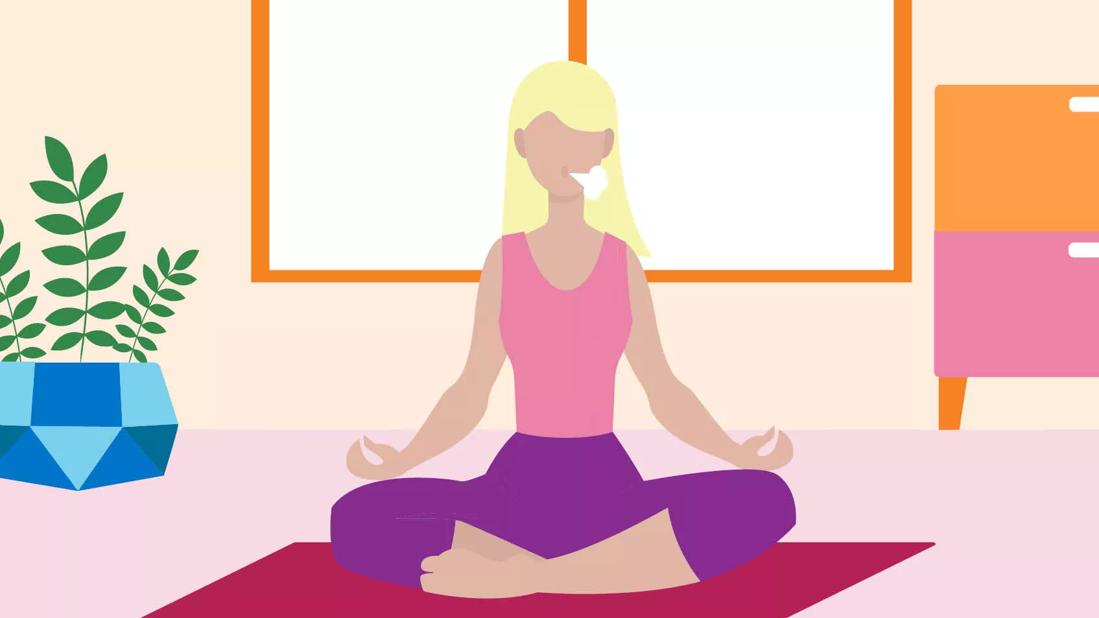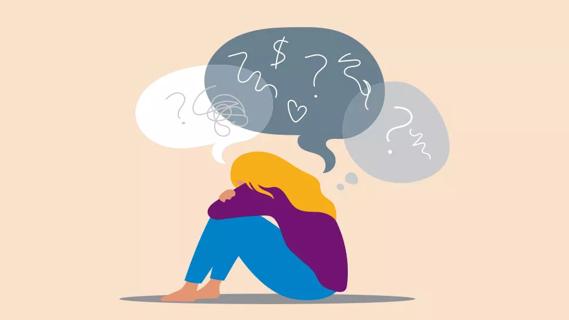Deep breaths, exercise and even your favorite scent can help calm those nerves

Everyone gets nervous. While the reasons may be different — whether you’re nervous about a big presentation at work, meeting someone new on a first date or having a tough conversation with a loved one — we all tend to feel the same things.
Advertisement
Cleveland Clinic is a non-profit academic medical center. Advertising on our site helps support our mission. We do not endorse non-Cleveland Clinic products or services. Policy
“When we get nervous, our body’s autonomic nervous system is triggered,” explains health psychologist Grace Tworek, PsyD. “The sympathetic system, also known as our fight-or-flight response, is largely unconscious. We don’t tell our body to feel nervous or on edge. It’s just our body responding to real or imagined threats.”
If you’re nervous you may experience an increased heart rate and start to sweat. You may even feel nauseated and have tightness in your chest. These symptoms can make getting through your tense situation even more challenging.
Ready to learn how to calm down? Dr. Tworek offers some tips on how to relieve stress and stop us from feeling on edge.
Even though our fight-or-flight response can be triggered when we’re nervous, there’s good news, says Dr. Tworek. “We often don’t engage the parasympathetic system, or our ‘rest-and-digest’ part of our body as often.”
In a perfect world, each time our sympathetic nervous system is engaged, the parasympathetic nervous system would kick in right afterward.
“But if we practice skills that help us relax, we can teach our body how to respond in different situations and that can be really helpful,” she adds.
When you’re feeling nervous, try these six techniques:
Advertisement
Dr. Tworek explains how these ways to calm down can help.
Take a few deep breaths. Go slow and breathe through your nose, filling your lungs with air. Then, slowly breathe out through your nose. Repeat a few times until you feel yourself calming down.
“Focusing on our breathing can distract us from whatever is making us feel on edge,” explains Dr. Tworek. “It can help with some of those short-term symptoms. Those nice deep breaths get oxygen into our body and allow all of those systems to calm down and turn off any alarm bells.”
You can even try breathing techniques like 4-7-8 breathing, five-finger breathing or alternate nostril breathing as ways to calm yourself down. And there are plenty of apps that focus on meditation and breathing.
Pop on your headphones and listen to some calming tunes — think classical music or nature sounds. But whatever you enjoy, whether that’s rap or heavy metal, should do the trick.
“Our favorite music can also serve as a way for us to focus our mind on something that has brought us joy in the past,” says Dr. Tworek.
Research shows that listening to tunes can help ease anxiety, as well as lower your heart rate, respiratory rate and blood pressure.
Feeling nervous? It may be time to phone (or text) a friend. By confiding in those closest to you, not only does it help you voice your concerns, but your support system can also give you advice and help you calm down.
“In addition, letting out stressors we may be holding in by talking about them can also provide a sense of relief,” notes Dr. Tworek.
Exercise can be beneficial for a lot of different reasons. Physical activity releases endorphins, which are chemicals that help relieve pain and reduce stress.
“We’re also giving our body a way to work out some of its nerves,” says Dr. Tworek. “You’ve probably heard people say that the body keeps score. If we have things that are making us nervous or on edge and we don’t let them out usually the body finds a way to get them out. And that might be through feeling emotional, irritable or nervous.”
Even removing yourself from the situation that’s making you nervous and going for a short walk around the block can help calm you down.
You may have also heard that scents like lavender can be calming. But don’t overlook other scents that are calming for you or that can transport you to a happy time and place in your life.
Maybe it’s the smell of chocolate chip cookies baking in the oven or an ocean breeze. Whatever it is, tap into it, encourages Dr. Tworek. So light that candle, spray that perfume or use that lotion.
Advertisement
“If there is something that reminds you of a happy place or a positive experience, make sure you have it around,” she says. “It can be a nice reminder when you’re feeling on edge. They can prime us to relax a little bit and focus more on those positive memories and experiences.”
If you try to ignore your nerves, it can become the only thing you focus on.
“Say aloud that you’re nervous or write it down,” advises Dr. Tworek. “Then, make sure to give yourself positive feedback. For example, think about how much you prepared for that work presentation. Giving ourselves that positive self-talk and also recognizing our nerves can be a really good way for our brain to replay those positive things.”
And don’t forget that we all get nervous — it’s a natural part of life. But how you act or feel when you’re nervous doesn’t have to consume your life. Once you learn how to calm yourself down and you find something that works for you, stick with it, says Dr. Tworek.
“If you find something that works really well for you, engage in it frequently,” she continues. “It’s not necessarily about the complexity of some of the things that we do to calm our nerves, it’s the consistency.”
In other words, practice, practice, practice.
Advertisement
“The more we practice engaging that rest-and-digest response, the better our body gets at learning how to relax,” says Dr. Tworek. “The more we do it, the more comfortable our body becomes in this space, meaning it will learn to get there on its own.”
But if you’ve tried a few different techniques to squash your nerves and nothing seems to work, don’t hesitate to reach out to a healthcare provider.
“If it ever gets to a point where feeling nervous or anxious starts to feel unmanageable or like it’s impacting you in multiple different areas of your life, it’s time to speak to your doctor,” says Dr. Tworek.
“There are different resolutions that can be explored, whether it’s engaging in regular therapy, a combination of medications or a little bit of both. The goal is to give you a skill set so that the symptoms are manageable and you can get back to doing the things that you enjoy.”
Advertisement
Learn more about our editorial process.
Advertisement

Going home isn’t always easy, but there are ways to ease any stress you might feel

Managing stress can help you sleep more soundly

This fast-acting anxiety medication should never be taken with alcohol, despite what you may see on The White Lotus

Deep breathing, positive mantras and tackling negative thoughts can help get you out of your head and cool down your anxiety

Focusing on what you can see, feel, touch and hear can help you feel more present in the moment

Performance anxiety and stage fright are outsized stress responses that can creep up when you’re put on the spot

A healthy amount of anxiety can keep you safe from harm and motivate you to take action

Although different conditions, they can occur together or cause one another

Wearing a scarf, adjusting your outdoor activities and following your asthma treatment plan can help limit breathing problems

Your diet in the weeks, days and hours ahead of your race can power you to the finish line

When someone guilt trips you, they’re using emotionally manipulative behavior to try to get you to act a certain way